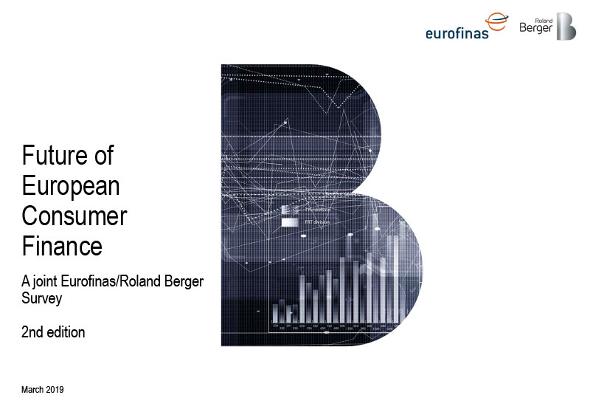

Consumer credit: Europe's consumer finance players see growth potential – and risks
Top leaders in 13 countries see digital transformation as the greatest challenge
Consumer finance players across Europe are expecting consumer credit business to continue to grow in the coming years. However, the division faces a number of challenges primarily related to digitization, which could further consolidate the market. This is the conclusion of the second joint study by Roland Berger and the “European Federation of Finance House Associations” (Eurofinas), entitled "Future of European Consumer Finance."
For the study, top executives from 92 bank subsidiaries and other providers were asked about possible market prospects, opportunities, and risks, as well as what they consider to be the key success factors for their industry, including automobile loans, personal loans, revolving loans, and earmarked loans.
Ninety-five percent of respondents agree that the consumer credit market will grow by up to 5%. However, they also believe that margins are likely to fall or at best remain stable. In addition, almost 70% of managers surveyed believe that the national markets – especially in Northern Europe, Italy, and Poland – will continue to consolidate in the coming years. They see the greatest growth potential in Spain, Portugal, and France.

Digital transformation as an important trend
According to the respondents, one of the greatest challenges so far has been issues of digital transformation such as big data, digital contracts or new identification technologies. More than 80% believe that digital transformation will be the most important technological trend in the coming years.
Another important issue is regulation, which is a source of concern for respondents. While the second Payment Services Directive (PSD2) - a directive of the European Commission regulating payment services and payment service providers - is primarily seen as an opportunity, the basic Data Protection Regulation makes business more difficult. Finally, the DSGVO leads to restrictions in data collection and processing as well as to increased administrative burdens.
Customer journey with new demands
Another part of the change is changing consumer behavior, which was also the subject of the survey. Seventy-two percent of managers stated that online use is likely to have the greatest influence here, followed by a trend away from ownership and towards pure use (62%), for example in the sense of the sharing economy. And as many as 52% of those surveyed believe that demographic change has a major influence on consumer behavior.
One possible consequence for the customer journey reads as follows: 74% of managers assume that customer care will have to be predominantly hybrid by 2021, i.e. a mixture of personal presence and remote support. One of the consequences of this would be that a functioning customer management system that takes advantage of omnichannel would be a basic prerequisite for further positive development in the industry.
Quality seems to be a crucial factor
As the study shows, European consumer financing thus faces complex challenges, some of which are interdependent. These are digitization, regulation, and the various changes in consumer behavior. However, it also shows that several strategy and distribution models will continue to co-exist and that the industry as a whole is developing positively. One finding is that the decisive factor might not be the choice of distribution model, but the quality of its implementation, especially with regard to the customer journey.
The full study can be found via this link





